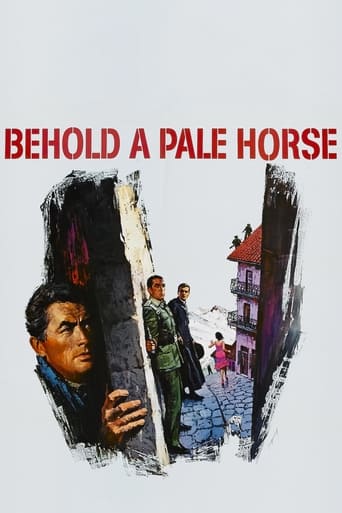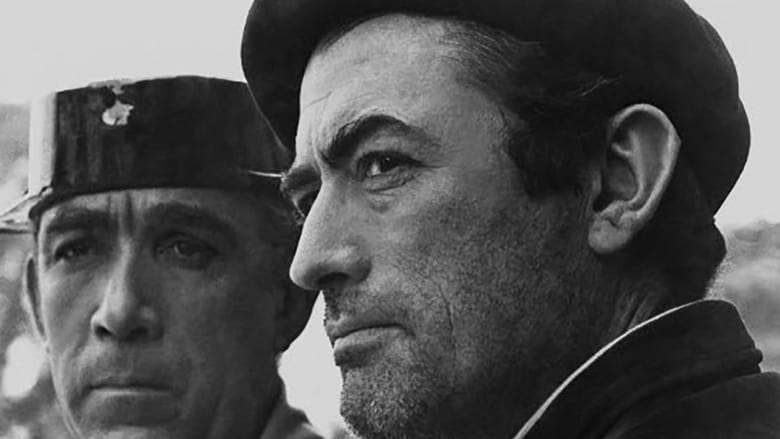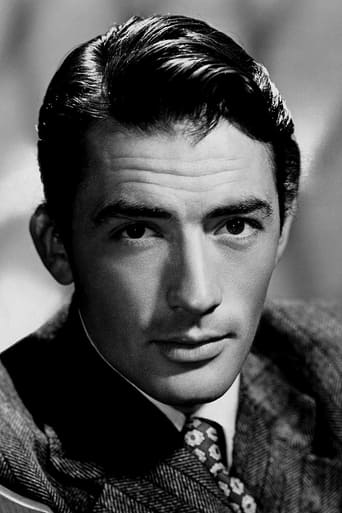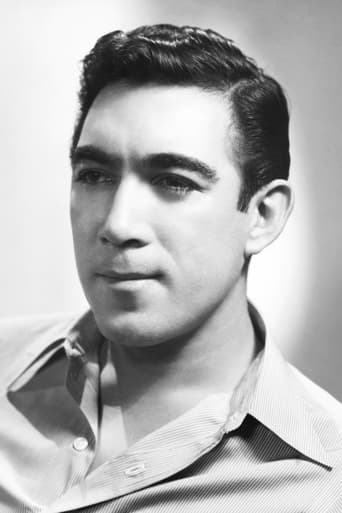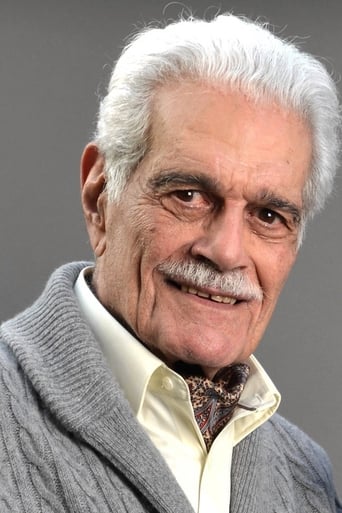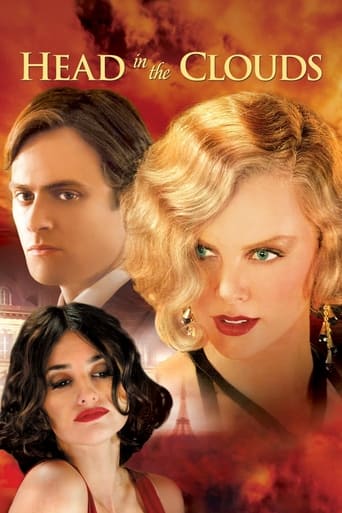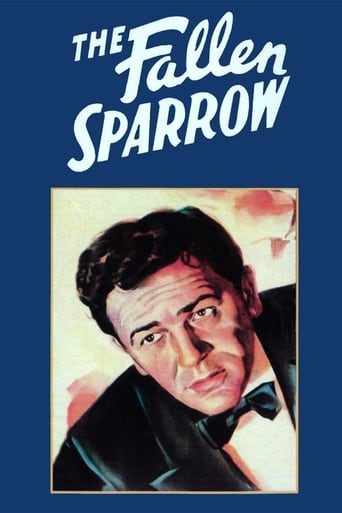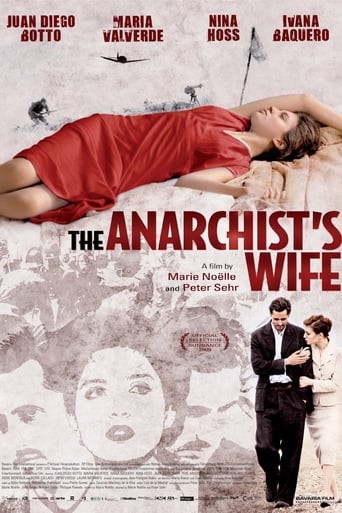Behold a Pale Horse (1964)
Manuel Artiguez, a famous bandit during the Spanish civil war, has lived in French exile for 20 years. When his mother is dying he considers visiting her secretly in his Spanish home town. But his biggest enemy, the Spanish police officer Vinolas, prepared a trap at the hospital as a chance to finally catch Artiguez.
Watch Trailer
Cast


Similar titles
Reviews
I got a DVD copy of "Behold a Pale Horse" and I can now after many years seeing it more calmly as I did a few times. It is a hymn to liberty and resistance to tyranny. Impressive in every way. A film that should make us wonder about its depth. Men who are murdered and banished from their homeland, children who lose their parents and grow up with the feeling of revenge. Mothers who die without the right to see their children banished to another country. Zinnemann made a masterpiece. The black and white only reinforce their distress. Peck have here a magnificent performance as the revolutionary Artiguez that an almost suicidal gesture, and that also deserves further analysis,back to their homeland, knowing that he would die, but why should it back to his mother and the boy who trusted him. The gesture is much more important than the continued oppression of Vinolas, Artiguez knew this would also end. At the end of the film there is the impression that Viñolas is the winner. Applauded by all those who live with tyranny, blind and cowardly. But Viñolas own wonders: Why Artiguez back? Each of us knows the answer: Artiguez returned to prove that it can be beaten but not defeated. His gesture fighting for freedom would bear fruit. Others would follow the the steps of Artiguez finally ridding Spain of terror that dominated the Franco era. A monumental wonderful work.
Wow, this film has some odd casting. Although the people in the film are supposed to be Spanish, none of the major actors in the film are from Spain. The weirdest casting was Gregory Peck. Gregory Peck?! At least Anthony Quinn kinda looks Spanish (heck, he's played just about every nationality there is plus half his background is Mexican). And having Muslim-convert Omar Sharif playing a Spanish Catholic priest...! All this is really strange and it's a shame they didn't let any Spaniards play these roles. Now part of this could be because Franco did NOT like the film and probably wouldn't have allowed anyone living in Spain to be in the film. But surely there must have been some expatriates or at least people who seemed more Spanish than Gregory Peck. He was a wonderful actor, certainly, but here he was badly miscast...as was Sharif.The film begins with a quick summary of the Spanish Civil War in the 1930s. At the end, when the Republican forces lost, the surviving fighters are shown turning in their arms and immigrating to France. However, Peck's character refuses to give up the fight and apparently spent the next 20 years making violent incursions into his native land. For this, he is now a wanted criminal--not just an ex-Republican soldier.Now, after 20 years, Peck is living in France and his mother back in Spain is dying. Police chief Quinn now plans to use this approaching death as a chance to lure Peck into a trap. Now considering that Peck has killed and robbed rather senselessly since the war ended, he does deserve to be captured, so in some ways you actually are rooting for the Fascist police to capture him. An interesting twist, as Americans in general were pro-Republican (or ambivalent).The problem is that when Peck doesn't fall into the trap right away AND his mother dies, Quinn needs to keep this a secret--otherwise the plan will come to nothing. But, unknown to Quinn, young priest Sharif has inexplicably agreed to take a message to Peck from his mother in the hospital that warns him of the trap. Now considering that the woman had refused the last rights and cursed God, it is confusing why a priest (and they were mostly pro-Nationalist/Franco) would take the trouble or risk to help. This is, by far, the biggest flaw with the film. His motivation for this was confusing--helping an Atheist to send a message to her Atheist son who is a wanted criminal and killer. Plus, what if priest-hating Peck just decides to kill him?!As far as Peck goes, as least his role is interesting. He is not sympathetic (considering his post-war record) and he's incredibly nasty at times to the young boy in the film. He slaps the kid and tells him to get lost. This is NOT Atticus Finch (TO KILL A MOCKING BIRD) or Ezra Baxter (THE YEARLING)!! I can commend Peck for being willing to play such an unlikable guy. And, the film is interesting in how it takes this child's hero-worship of Peck and quickly erodes it.The problem is, for many, with the Franco government (they're bad, m'kay?!) and a violent criminal who lost sight of his once commendable cause, you are left wondering who to root for in the film. For some, this isn't a problem and for others, like myself, I really didn't care about the characters so I was left feeling disconnected and ambivalent.Now it is well made and well directed, but it's still a film I'd rather have not seen. With so many films out there, I could have easily done better.
As I said on the message board about this film, I agree with those who felt that Peck was miscast as a European. My view of Peck is that he is a STAR, one who is effective really only in parts that suit his very American, warm hearted, leading man persona.As for the reviewer who complained that 1964 was a bit late to be making a feature in black-and-white, actually, no, lots of features continued to be made in black-and-white for another three years, at least. By 1967, it was a lot rarer to find one, even from the more arty or new wave directors in Europe, where black-and-white had been de riguer, for the most part. Bogdanovich's "The Last Picture Show" and "Paper Moon" were retro glories by the early 70s. (I think he used a red or infrared filter to get those great darks in his b&ws.) Forgive the digression. I found the film to be a failure by Zinneman - too many parts don't fit well, and too long.
I really liked this film but think that if fell very short in several things. The story is of two old adversaries who can not give up the fight and a third that is thrust into the middle of the feud. Grudges are hard enough to give up but commitment to causes that cost blood are all but impossible. That is what this movie does so well as it tells this story. The three principals, being the kind of actors they are simply did what they always did and put the stamp of their own character on the role they played. It is so easy to transpose almost any character played played by Gregory Peck or Anthony Quinn between the different movies they act in. Omar Shariff does a lot better taking on the role rather.The ending is without adequate support in my opinion and seems more meaningless than it was intended to be. Peck's character seems to want to make some grand statement but there is no real motivation for it.The boy Paco who is so important in the movie is unfinished and unredeemed. Marietto plays Paco very well and Paolo Stoppa outshines most of the others.

